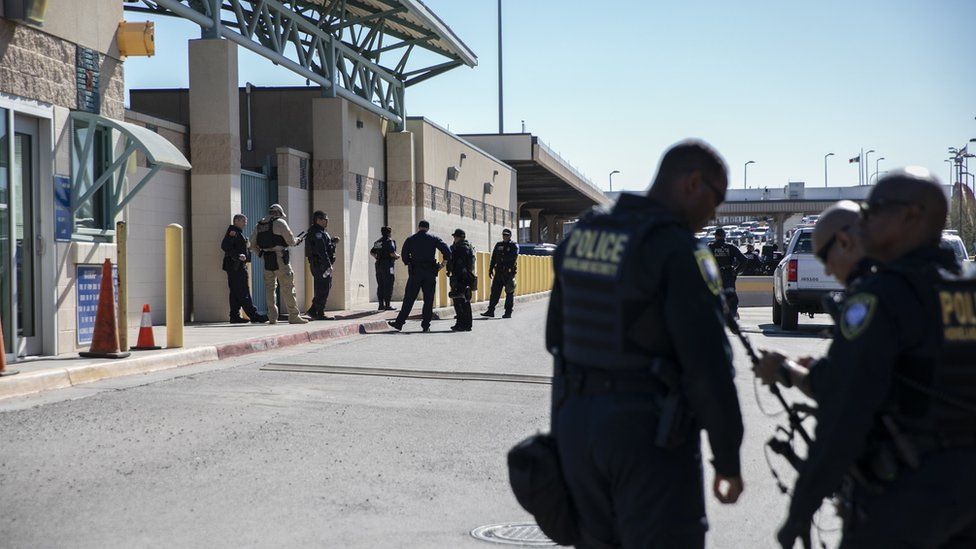Migrants force-fed at Texas detention centre
- Published

Officers from the Department of Homeland Security guard the border with Mexico in El Paso
Six migrants on hunger strike at an immigration detention centre in Texas are being force-fed, officials say.
Immigration officials are using plastic nasal tubes to feed four men, which family members say are causing severe nosebleeds and vomiting.
The detainees are refusing food in protest against conditions at El Paso Processing Center.
Immigration and Customs Enforcement (ICE) says a federal judge authorised the force-feeding this month.
AP says the detainees, mainly from India and Cuba, went on hunger strike to protest against guards verbally abusing them and threatening to deport them.
They are also protesting against the length of time they are being detained while they await legal proceedings.
As well as the detainees in El Paso, another four men are on hunger strike in Miami, Phoenix, San Diego and San Francisco, ICE says.
When a person is force-fed through the nose, a lubricated tube is pushed through the nostril until it reaches the throat. Liquid food is then pumped into the stomach.
An ICE spokesperson told BBC News that 11 detainees were currently on hunger strike in El Paso, and that "hunger strike protocols" were triggered after they missed their ninth consecutive meals.
"Of these 11, six are currently being hydrated and fed non-consensually," the spokesperson added.
Protesters in El Paso calling for immigration reform
Officials say that the force-feeding is for the migrants' own health and safety, as going without food for long periods of time can leave people at risk of long-term physical and mental health conditions, external.
But the relatives of the detainees say they are suffering more because of the force-feeding.
A spokesman for the World Medical Association - which is officially partnered with the World Health Organization and the American Medical Association - told BBC News it remained against force-feeding.
"Forced feeding is never ethically acceptable," the organisation says in its declaration on hunger strikers. "Even if intended to benefit [the detainee], feeding accompanied by threats, coercion, force or use of physical restraints is a form of inhuman and degrading treatment."
What is happening at the US-Mexico border?
Part of a fence at the US-Mexico border
The treatment of migrants crossing into the US from Mexico is an extremely divisive issue.
US President Donald Trump made immigration a cornerstone of his 2016 campaign, calling for tough crackdowns on migrants from Central and South America, as well as some countries in the Middle East and North Africa.
But when reports emerged last year of children being separated from their parents at the southern border and held in detention centres, it sparked a global outcry.
According to officials earlier this month, it is now believed that almost 3,000 children were taken from their families last summer under the "zero tolerance" policy.
Mr Trump withdrew the policy on 20 June 2018.
However he has continued to call for a physical wall across much of the US-Mexico border, warning just before last year's mid-term election in November that thousands of people were arriving from Central America as part of a "migrant caravan".
After the mid-terms, Mr Trump's unmet demands for Congress to approve the $5.7bn (£4.3bn) required to build the wall led to the longest government shutdown in US history.
The 35-day shutdown, which saw thousands of federal workers going without pay, was finally lifted last Saturday after the president yielded to political pressure.
- Published17 January 2019
- Published11 July 2019
- Published30 January 2017